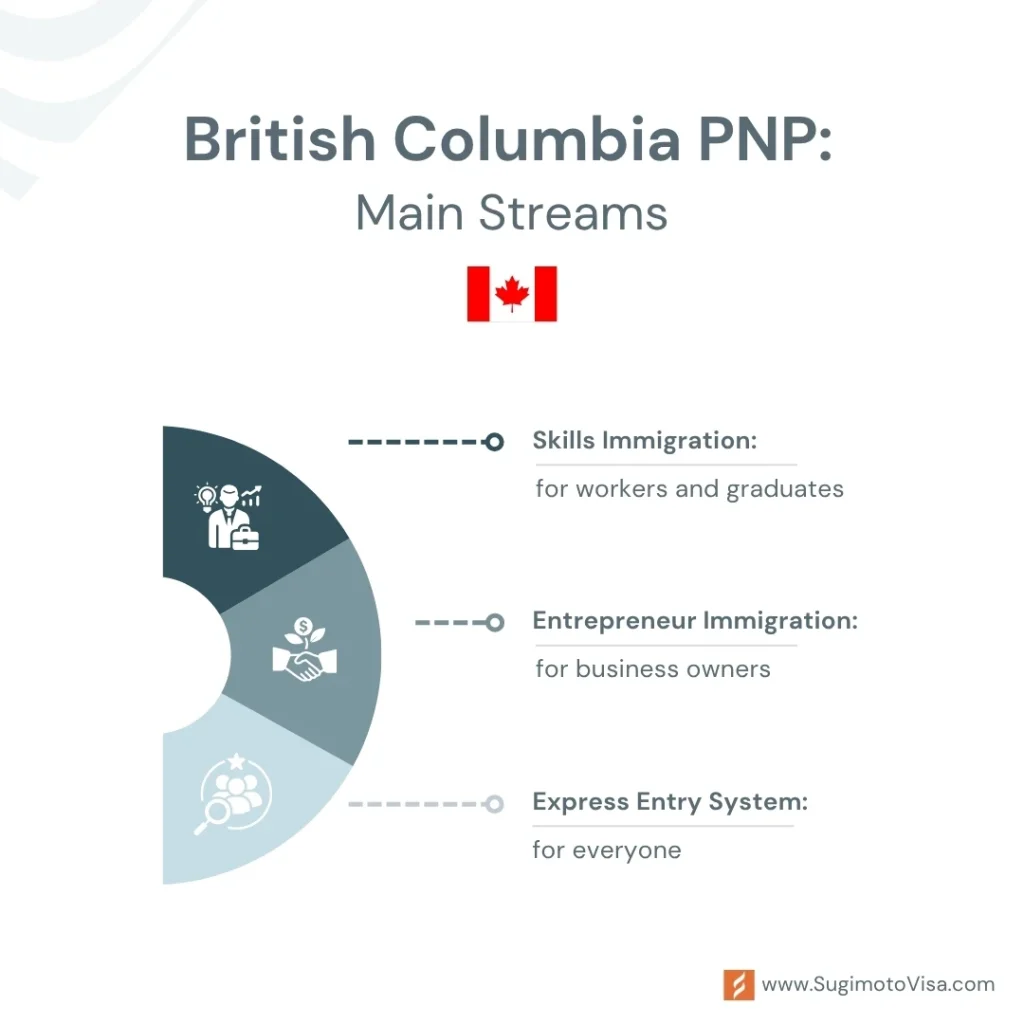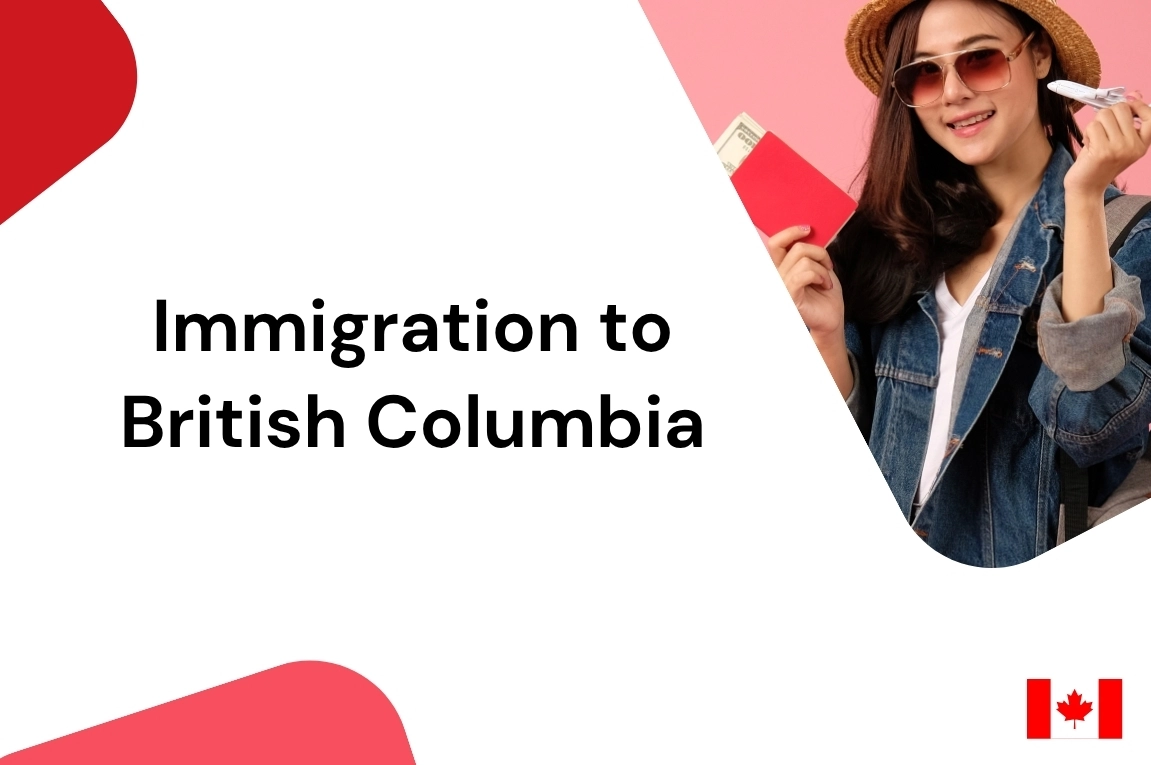Do you dream of living in a beautiful place like British Columbia (BC), Canada? Many people do! BC offers vibrant cities, excellent job opportunities, and breathtaking natural landscapes.
The British Columbia Provincial Nominee Program (BC PNP) is a targeted immigration program designed to help you relocate to British Columbia.
- Purpose:
The BC PNP helps British Columbia choose people with the skills or business ideas it needs to grow its economy, allowing them to gain Canadian permanent residence. - Main Streams:
- Skills Immigration (for workers and graduates)
- Entrepreneur Immigration (for business owners)
👉 Not sure which immigration path suits you best? Fill out our assessment form.
British Columbia – Quick Facts
- Country/Province Name: Canada / British Columbia
- Capital: Victoria
- Population: Around 5.5 million people
- Weather:
- Winters are mild, especially near the coast (0°C to 10°C)
- Summers are warm and pleasant (20°C to 30°C)
- Lots of rain in Vancouver and coastal areas in fall and winter
- Language: English is the main language spoken
- Best Cities to Live In:
- Vancouver – large, diverse, and full of job opportunities
- Victoria – peaceful and scenic, great for families
- Surrey – growing fast, multicultural, and more affordable
- Kelowna – sunny, surrounded by nature, and a relaxed lifestyle
- Burnaby – close to Vancouver with great schools and transit
- Best Immigration Pathways:
- Express Entry
- BC PNP
- Study Permit
- Work Permit
- Family Sponsorship
| Feature | Details |
|---|---|
| Program Name | British Columbia Provincial Nominee Program (BC PNP) |
| Main Purpose | Attract skilled workers, graduates, and entrepreneurs to B.C. |
| Main Streams | Skills Immigration, Express Entry BC, Entrepreneur Immigration |
| Processing Time | 2–3 months (varies by stream) |
| Job Offer Required | Yes, for most streams |
| Language Requirement | CLB 4–7 depending on stream |
| Target Occupations | Tech, healthcare, trades, and high-demand B.C. jobs |
| Permanent Residency | Yes, via nomination and IRCC application |
📢 Latest News and Updates
This year brings some changes. Canada has allocated fewer immigration spots to BC for 2025. This means:
- BC will issue fewer invitations to apply.
- The program will primarily focus on individuals in healthcare and childcare professions.
- Business owners remain a high priority and are still strongly encouraged to apply!
Immigration to British Columbia Pathways
Immigration pathways to British Columbia are divided into two groups:
- BC Provincial Nominee Program (BC PNP) pathways
- Other immigration Options
1️⃣ BC PNP Pathways

Skills Immigration
For workers and graduates, often requiring a BC job offer.
- Skilled Worker: For professionals in high-demand jobs (e.g., healthcare, tech, engineering).
- Healthcare Professional: For doctors, nurses, and care aides.
- International Graduate: For recent Canadian graduates with a BC job offer.
- International Post-Graduate: For BC Master’s/PhD graduates in science or health (no job offer needed).
- Entry Level & Semi-Skilled: For tourism, food processing, or certain jobs in northern BC (9+ months work required).
- Express Entry BC: Faster PR for Skills Immigration applicants who also qualify for federal Express Entry.

Entrepreneur Immigration
For those starting or buying a business in BC.
- Base Stream: Start or buy a business anywhere in BC; requires investment and job creation.
- Regional Stream: Open a business in a smaller BC community with local endorsement.

2️⃣ Other Immigration Options

Study in BC
Earn a degree or diploma from BC institutions (e.g., UBC, SFU).
- Get a Post-Graduation Work Permit (PGWP).
- Gain Canadian work experience for PR eligibility

Work in BC
For skilled workers in in-demand sectors (tech, trades, healthcare).
- With job offer: Apply for a work permit, possibly BC PNP.
- Without job offer: May qualify through Express Entry if eligible.

Federal Express Entry
Canada’s main points-based immigration system.
- Choose BC as your destination in your profile.
- High-scoring candidates are invited to apply for PR.

Family Sponsorship
For those with close family in BC who are Canadian citizens or PR holders.
- Applies to spouses, dependent children, and sometimes parents.

Start a Business (Non-PNP)
For entrepreneurs under federal programs (e.g., Start-up Visa, Self-Employed).
- Suitable for innovative business ideas or cultural/athletic self-employment.
✅ Tips:
- High Score Needed: Due to fewer available spots, you will need a higher “score” to receive an invitation. Your score is based on factors like your job, education, language proficiency, and experience.
- Focus on Priority Jobs: If your occupation is not in healthcare or childcare, it might be very difficult to receive a Skills Immigration invitation in 2025.
Documents You’ll Need (Paperwork Checklist!)
When applying for the BC PNP, you’ll need to provide numerous essential documents. These documents help BC assess your identity, qualifications, and eligibility. It’s critical to have all the correct paperwork; missing documents can delay or even result in the rejection of your application.
Here are the main types of documents you’ll typically need:
1. Personal Documents
- Passport: A copy of your valid passport (the page with your photo and details).
- Birth Certificate: Your official birth certificate.
- Marriage Certificate (if applicable): Or proof of common-law partnership.
- Family Information: Documents related to your family members (spouse, children), even if they are not immigrating with you.
- Photos: Recent passport-style photographs of yourself.
2. Education Documents
- School Diplomas/Degrees: Copies of all your academic certificates, diplomas, or university degrees.
- Transcripts: Official records of your grades from educational institutions.
- Educational Credential Assessment (ECA): If you studied outside Canada, you’ll need a report confirming that your foreign education is equivalent to Canadian standards. This is extremely important!
3. Work Experience Documents
- Job Offer Letter (for most Skills Immigration applicants): A genuine, signed letter from your BC employer confirming a full-time, permanent job offer. This letter must include details about your job title, duties, pay, and hours.
- Work Experience Letters: Official letters from all your previous employers. These letters must state:
- Your job title
- Your duties and responsibilities
- The duration of your employment
- Your salary
- Resume/CV: Your updated resume outlining your complete work history and education.
4. Language Documents
- Language Test Results: You must take an official English (or French) language test. The most commonly accepted tests are:
- IELTS General Training
- CELPIP-General
- TEF (for French)
- TCF (for French)
- New for 2025: Some streams may also accept the Pearson Test of English (PTE) Core.
- Your test results must be current (typically less than two years old).
5. Proof of Funds (Financial Documents)
- Bank Statements: Official letters from your bank showing your current financial holdings. This demonstrates your ability to support yourself and your family upon arrival in BC. It should indicate your account balance and show the financial activity in the account for the last six months.
- Important for 2025: The required amount of funds has increased. Ensure you check the latest amounts published by the Government of Canada (IRCC).
- Other Investments: Documentation for other easily accessible funds, such as fixed deposits.
6. Other Important Documents
- Police Certificates: From every country where you have resided for six months or more since turning 18. This is to confirm you do not have a criminal record.
- Medical Exam Results: You may need to undergo a medical examination from an approved panel physician.
Which City Is Right for You?
Everyone’s dream life looks a little different. Here’s a quick look at some of the top cities in BC:
- Vancouver: Busy, exciting, and full of job opportunities. It’s also the most expensive.
- Victoria: Peaceful and scenic, with lots of charm. Great for families and those who want a slower pace.
- Surrey: A fast-growing, multicultural city that’s more affordable than Vancouver.
- Kelowna: Sunny and family-friendly, with a slower pace and a growing economy.
- Kamloops / Nanaimo: Smaller cities with lower rent and a peaceful lifestyle.
What to Expect When You Arrive
You made it to BC, now what? Here’s what to expect in your first few months:
✔️ Finding a Home
- Start with a short-term rental while you explore neighborhoods.
- In big cities, shared rentals are common and more affordable.
✔️ Job Hunting
- Canadian-style resumes are different, don’t worry, you’ll learn quickly.
- Local job centers and immigrant support groups are here to help.
✔️ Getting Around
- Public transit is reliable in most cities.
- Things like setting up a phone, bank account, or health card are usually done online.
✔️ Making Friends
- Join free language meetups, local events, or volunteer groups.
- Many cities have newcomer welcome programs.
BC Challenges and How to Overcome Them
Every place has ups and downs. BC is no different. Here are a few common challenges, and how to handle them:
- High Living Costs
- It’s no secret: rent and groceries are pricey in cities like Vancouver.
- Try this: Consider smaller cities like Surrey, Nanaimo, or Kamloops. They’re more affordable and still offer great opportunities.
- Language Barriers
- English might feel overwhelming at first.
- What helps: Free classes like LINC, or just chatting with locals to improve.
- Rainy Weather
- Especially in Vancouver, winters are wet.
- What helps: Get a quality umbrella and learn to enjoy cozy indoor life!
- Feeling Homesick or Alone
- Most newcomers feel this way at some point.
- What helps: Join your local cultural or religious community, or sign up for a fun class.
Final Thoughts
Moving to a new province or country can feel overwhelming, but you’re not alone.
Whether you’re seeking city energy, a calm retreat in nature, or a place to raise your kids, British Columbia has something to offer you.
We believe in your journey. You’ve got the courage to make this move, and we’re here to guide you every step of the way.
👉 Fill out our free assessment form and let’s find the right immigration path for you.
FAQ
Absolutely! From jobs and education to nature and culture, BC is a top choice for newcomers.
A: No, but it significantly helps! A nomination from BC provides a considerable advantage when you apply to the federal Canadian government (IRCC) for PR.
A: For most individuals, no, it’s more challenging because BC has fewer allocated spots. However, it still presents a strong opportunity for healthcare, childcare professionals, and business owners.
Not necessarily. While some programs do require it, others (like study permits or Express Entry) don’t.
A: For most worker streams, yes, you’ll need a full-time job offer from a BC company. However, for some pathways (like International Post-Graduates in science/health), a job offer might not be required. Business owners need a business plan, not a job offer.
A: It can take several months for BC to process your application after you’re invited. Subsequently, the federal Canadian government will take additional time to process your PR application. In 2025, some stages might experience longer processing times due to fewer available spots.
A: Yes, many individuals apply while already working or studying in Canada. You must ensure your legal status (such as your work or study permit) remains valid throughout the application process.
It can be. But it also has a strong job market and amazing lifestyle. Many newcomers start in Vancouver and later move to more affordable places.


